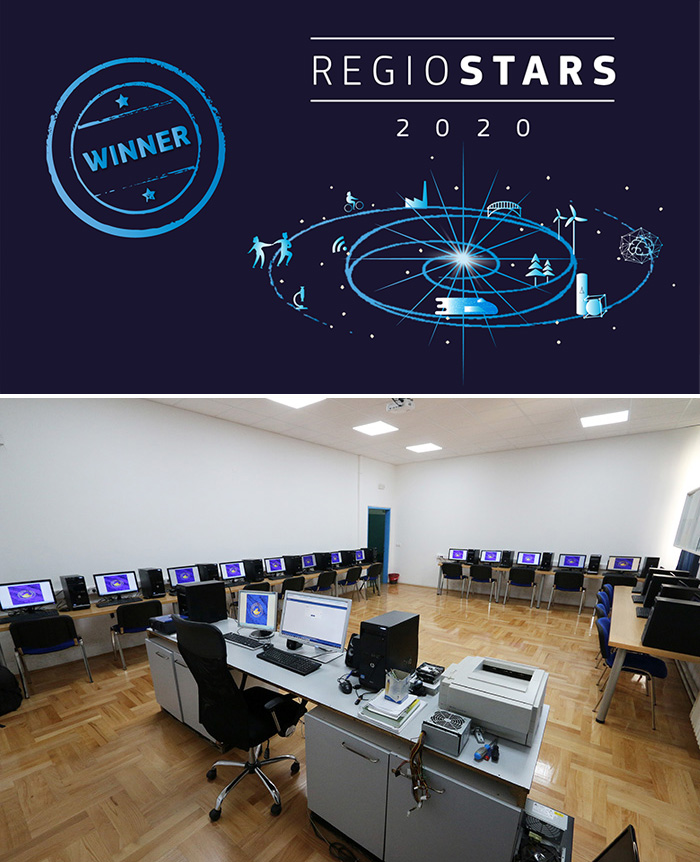The e-Schools pilot project provided ICT equipment and digital education tools for 151 primary and secondary schools in Croatia. This helped 10 % of the country’s schools to raise their level of competence in the use of ICT for teaching and learning. Along with ongoing support and training for teachers and principals, the resulting comprehensive approach helped to ensure the project’s long-term sustainability.
The e-Schools project moves Croatian children and teachers towards digital education
- 09 April 2020
The current shift to remote learning, although challenging, was significantly mitigated by the core project results, helping some 50 000 teachers and 500 000 students switch to a new level of education.
The 151 schools selected for the pilot were equipped with local network infrastructure and two types of classrooms – interactive and presentation. Teachers, principals and administration staff received tablets or laptop computers, digital content for teaching and learning, and a system to manage their schools’ administration.
The selected schools were evenly distributed across the country to ensure that the impact was felt in all regions. The most significant improvements were seen in areas where schools were lagging behind in ICT use.
The pilot project directly involved 7 000 teachers and 23 000 pupils. While it could not have anticipated the impact of the COVID-19 pandemic, it ensured that all of the country’s teachers and pupils were able to make use of digital content and services during the lockdown. This benefitted some 50 000 teachers and 500 000 pupils.
Greater motivation
The work done has increased the motivation of pupils and teachers to use ICT. The teacher’s role has shifted more to that of being a facilitator, and pupils are now more actively involved in learning.
According to an evaluation completed when the project started, of the 151 schools taking part, 124 were classified as digital beginners (level 2 out of 5) and the remaining 27 as e-enabled (level 3).
By the end of the project in 2018, 147 of the schools had improved their digital competence by at least one level, which represents 10.7 % of Croatia’s 1 368 schools. Only four of the 151 schools were still classified as digital beginners.
Developing skills
The project was part of efforts to address structural deficiencies in Croatia’s labour market, namely the mismatch between the education system and labour market needs. e-Schools ensured the systematic introduction of ICT in schools.
The partners recognised that helping teachers to develop their digital competence was a vital part of the project. This was provided through constant support and professional development from the Croatian Academic and Research Network (CARNET). Five regional training centres were established and more than 1 900 workshops, e-courses and webinars were organised. CARNET provided a helpdesk and mobile teams to offer on-site assistance at schools.
An online platform was used to create a virtual community where headmasters and teachers could share knowledge and exchange ideas.
Better management and communication
Higher levels of digital competence has made school management more efficient and transparent, optimised business processes and helped with planning. It has made it easier for schools to communicate with each other, with parents, and with the government.
Based on the pilot phase, a framework and strategy are being developed for implementing the concept in around 700 primary and secondary schools (50 % of all Croatian schools) during 2019-2022.
In the longer term, the project will better prepare pupils for higher education and encourage lifelong learning. It will contribute to a more highly skilled labour force and to raising the levels of employability.
Total investment and EU funding
Total investment for the project “e-Schools: Establishment of the system for the development of digitally mature schools (pilot project)” is EUR 40 375 200, with the EU’s European Regional Development Fund and European Social Fund contributing EUR 34 318 920 through the “Competitiveness and Cohesion” and “Efficient Human Resources” Operational Programmes for the 2014-2020 programming period. The investment falls under the priority “education (e-schools) and vocational training”.

